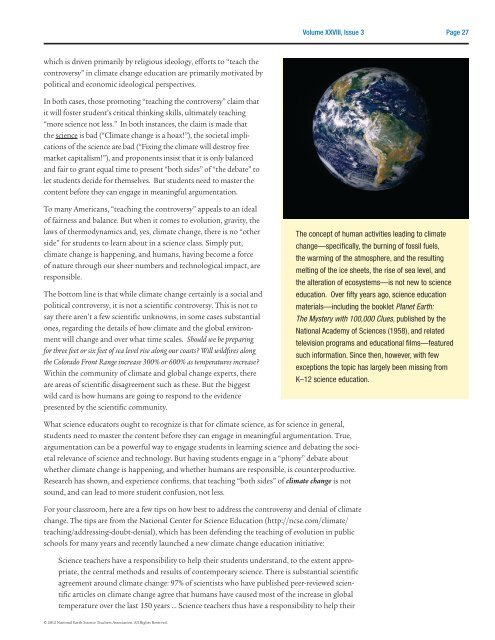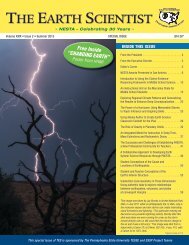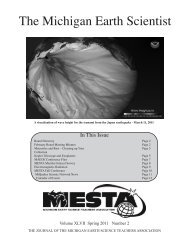The Earth Scientist
Fall 12.pdf - NESTA
Fall 12.pdf - NESTA
- No tags were found...
You also want an ePaper? Increase the reach of your titles
YUMPU automatically turns print PDFs into web optimized ePapers that Google loves.
Volume XXVIII, Issue 3<br />
Page 27<br />
which is driven primarily by religious ideology, efforts to “teach the<br />
controversy” in climate change education are primarily motivated by<br />
political and economic ideological perspectives.<br />
In both cases, those promoting “teaching the controversy” claim that<br />
it will foster student’s critical thinking skills, ultimately teaching<br />
“more science not less.” In both instances, the claim is made that<br />
the science is bad (“Climate change is a hoax!”), the societal implications<br />
of the science are bad (“Fixing the climate will destroy free<br />
market capitalism!”), and proponents insist that it is only balanced<br />
and fair to grant equal time to present “both sides” of “the debate” to<br />
let students decide for themselves. But students need to master the<br />
content before they can engage in meaningful argumentation.<br />
To many Americans, “teaching the controversy” appeals to an ideal<br />
of fairness and balance. But when it comes to evolution, gravity, the<br />
laws of thermodynamics and, yes, climate change, there is no “other<br />
side” for students to learn about in a science class. Simply put,<br />
climate change is happening, and humans, having become a force<br />
of nature through our sheer numbers and technological impact, are<br />
responsible.<br />
<strong>The</strong> bottom line is that while climate change certainly is a social and<br />
political controversy, it is not a scientific controversy. This is not to<br />
say there aren’t a few scientific unknowns, in some cases substantial<br />
ones, regarding the details of how climate and the global environment<br />
will change and over what time scales. Should we be preparing<br />
for three feet or six feet of sea level rise along our coasts? Will wildfires along<br />
the Colorado Front Range increase 300% or 600% as temperatures increase?<br />
Within the community of climate and global change experts, there<br />
are areas of scientific disagreement such as these. But the biggest<br />
wild card is how humans are going to respond to the evidence<br />
presented by the scientific community.<br />
<strong>The</strong> concept of human activities leading to climate<br />
change—specifically, the burning of fossil fuels,<br />
the warming of the atmosphere, and the resulting<br />
melting of the ice sheets, the rise of sea level, and<br />
the alteration of ecosystems—is not new to science<br />
education. Over fifty years ago, science education<br />
materials—including the booklet Planet <strong>Earth</strong>:<br />
<strong>The</strong> Mystery with 100,000 Clues, published by the<br />
National Academy of Sciences (1958), and related<br />
television programs and educational films—featured<br />
such information. Since then, however, with few<br />
exceptions the topic has largely been missing from<br />
K–12 science education.<br />
What science educators ought to recognize is that for climate science, as for science in general,<br />
students need to master the content before they can engage in meaningful argumentation. True,<br />
argumentation can be a powerful way to engage students in learning science and debating the societal<br />
relevance of science and technology. But having students engage in a “phony” debate about<br />
whether climate change is happening, and whether humans are responsible, is counterproductive.<br />
Research has shown, and experience confirms, that teaching “both sides” of climate change is not<br />
sound, and can lead to more student confusion, not less.<br />
For your classroom, here are a few tips on how best to address the controversy and denial of climate<br />
change. <strong>The</strong> tips are from the National Center for Science Education (http://ncse.com/climate/<br />
teaching/addressing-doubt-denial), which has been defending the teaching of evolution in public<br />
schools for many years and recently launched a new climate change education initiative:<br />
Science teachers have a responsibility to help their students understand, to the extent appropriate,<br />
the central methods and results of contemporary science. <strong>The</strong>re is substantial scientific<br />
agreement around climate change: 97% of scientists who have published peer-reviewed scientific<br />
articles on climate change agree that humans have caused most of the increase in global<br />
temperature over the last 150 years … Science teachers thus have a responsibility to help their<br />
© 2012 National <strong>Earth</strong> Science Teachers Association. All Rights Reserved.






